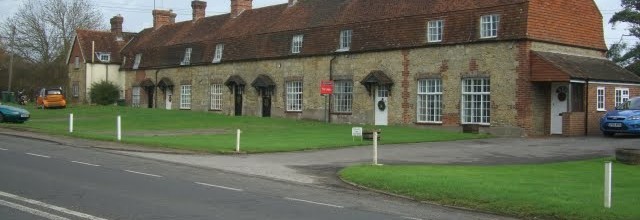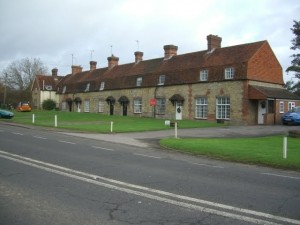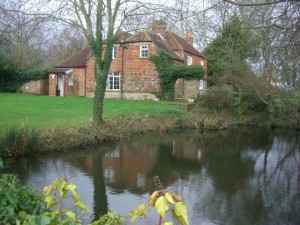
Martin Pippin quest: Adversane
Adversane on a raw, windy day in December bears little resemblance to the village Farjeon writes about. The cottages from which the children would have come to play are still there, although with several rather sinister looking vehicles parked outside. The road is busy: no parent would allow young children to become absorbed in a game alongside the traffic that roars past now.
There’s a conference centre, several liveries, and studs and riding schools. At least three gardens have trampolines and two have treehouses, showing that there are still plenty of children, although the conkers on the ground on one of the green areas in the village suggest that they aren’t allowed to play out in the way that Farjeon describes, with mothers calling from windows in the evening light for children to come home to ‘warm milk and cool sheets’ – about as delicious a description of the summer evening diminution from awake to asleep as I have ever read.
Adversane is definitely low-lying. The willows make it clear that the water table is high and both sides of the road along the village have humpy low ground and black swamp puddles. There’s a selection of ponds to choose from, but this seems most likely, to me, to be the duckpond Martin Pippin travels over to banter with Joan, Jane, Joscelyn, Joyce, Jennifer and Jessica.
Maybe in April Adversane looks like the idyll Farjeon depicted, but between Christmas and New Year it’s bleak and bland. Bleak in the way the wind whistles, the ground squelches and the traffic blares through it. Bland in its unemphatic landscape, its intermittent (when traffic free) silence and its lack of obvious community centre.
Except for the pub. The Blacksmith’s Arms offers a glimpse of the past – not just a glimpse, more of a long reflective backwards stare. It’s beamed and plastered, flagstoned and panelled and smells of beer and long-departed ashtrays: the malodour of many misspent youths, wasted middle years and gently declining old ages. I grew up in pubs like that, and everything—from the gravy that trickled onto my plate of liver and bacon with all the languor and richness of honey, to the expressionless face of the well-kempt barmaid who’s seen it all before—took me back to childhood in a rush of clattering emotions like dropping a bucket down a well.
So this quest starts promisingly: I meet my eleven-year-old self in memory in a way I never expected and she brought with her a sidelight to the book I had never considered. While the children were playing on the green and their mothers were heating milk and shouting from windows, where were the fathers?
Right where I was – in the pub. And the story rounded out for me in a new and fascinating way. I was where the missing part of the cast had been, and that almost made me a part of the book.




1 Comment
Bunny
7th January 2012Wonderful how proof lies in the abssence of things: those conkers without children to fight over them. Great idea, Kay, to revisit places. Have you considered (if they’re even real) Madame Bovary’s haunts? Flaubert paints them with such a fine brush…